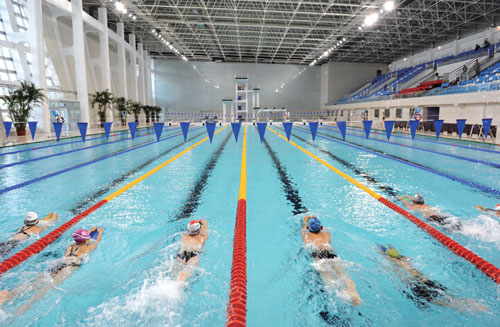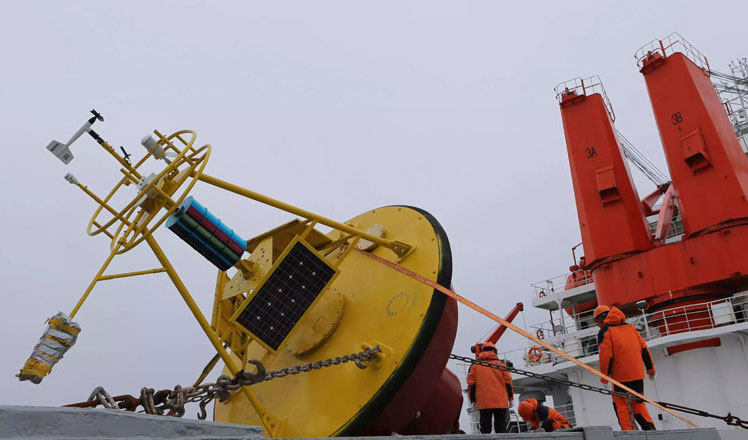The shocking truth about urinating in pools
Updated: 2016-07-20 08:53
By Sun Xi(China Daily)
|
||||||||
 |
| Karamay people swim at the standard pool of the expanded Karamay Swimming Pool, one of the best swimming pools in northwest China. [Photo/Agencies] |
Where should we urinate? Most people are likely to say, "the washroom, of course". But how about a swimming pool?
As crazy and outrageous as it sounds, urinating in swimming pools is an open secret around the world. According to a recent Travelocity survey of 9,500 vacationers from North America, Europe and the Asia-Pacific region, 64 percent United States citizens, 58 percent Canadians, 46 percent Britons, 44 percent Germans admitted to urinating in the pool at least once or having no problem doing it secretly. A bit conservatively, only 41 percent of Chinese travellers think that is okay.
But recent inspections in Beijing showed low chlorine and high urea levels are common in outdoor swimming pools. The high level of urea is caused by swimmers' sweat and urine, which were found in pools even in previous tests. Also, most pools are believed to use cheaper and substandard chlorine and other disinfectants so as to save operational costs.
Urinating in public has been common both in developing and developed countries. India at times is described as "the world's largest open air toilet" because of its people's habit of defecating in the open. Lack of enough public toilets is another reason why people urinate in the streets. For instance, in New York, 94,150 court summonses were issued to people between January 2011 and July 2014 for urinating in public, but just three new public toilets have been built in the city of 8 million people since 2008.
Most swimming pools, however, usually have enough toilets, so why do so many swimmers still choose to urinate in the pool?
Some claim swimming increases the frequency of urination, mainly because of the temperature effect. A former member of the US national swimming team even said "nearly 100 percent of competitive swimmers urinate in the pool regularly", because "tons of swimmers that always, regardless of prior planning, had to pee right before a race. What to do if you're desperate?"
Even if this sounds excusable, it is still unnecessary for common swimmers to follow such practice, because toilets are just walking distance from the pool. Children may be forgiven for urinating (or even pooping) in the pool unconsciously, but adults have no excuse to do so.
It is just a rumour that a chemical added to pools turns a conspicuous color when urine comes in contact with it. But even if urine in pools is not easily detected, one should not urinate in the pool for the sake of hygienic and health reasons.
According to a new survey by US researchers, most Americans incorrectly blame chlorine for causing irritation in and reddening swimmers' eyes. In fact, chlorine and other disinfectants are used to kill germs, and urine depletes the chlorine level in the pool and causes irritation in swimmers' eyes; it could even lead to a running nose and coughing.
Moreover, the "chlorine" odor in and around pools is not actually chlorine. The most common cause of the funny smell is chloramine that forms when chlorine mixes with ammonia or nitrogen compounds like swimmers' urine and sweat. The best way to prevent chloramine is to maintain recommended chlorine levels and also to shock or super-chlorinate pools regularly.
Although some people think it is not a big deal to urinate in a large pool, is it really comfortable for them to imagine themselves swimming in a big "toilet"? Swimmers should use the pool to swim, the washroom to urinate and the shower to wash up. We should not risk our health for just enjoying a little but disgusting convenience.
The author is a consultant for the Institute of Water Policy at the Lee Kuan Yew School of Public Policy, the National University of Singapore.

 Taiwan bus fire: Tour turns into sad tragedy
Taiwan bus fire: Tour turns into sad tragedy
 Athletes ready to shine anew in Rio Olympics
Athletes ready to shine anew in Rio Olympics
 Jet ski or water parasailing, which will you choose?
Jet ski or water parasailing, which will you choose?
 Icebreaker Xuelong arrives at North Pacific Ocean
Icebreaker Xuelong arrives at North Pacific Ocean
 Tourists visit Yehliu Geopark in New Taipei
Tourists visit Yehliu Geopark in New Taipei
 Uphill battle for cyclists in downhill race in Zhangjiajie
Uphill battle for cyclists in downhill race in Zhangjiajie
 Shennongjia added to World Heritage List
Shennongjia added to World Heritage List
 Campers sleep perched on cliff face in Central China
Campers sleep perched on cliff face in Central China
Most Viewed
Editor's Picks

|

|

|

|

|

|
Today's Top News
Ministry slams US-Korean THAAD deployment
Two police officers shot at protest in Dallas
Abe's blame game reveals his policies failing to get results
Ending wildlife trafficking must be policy priority in Asia
Effects of supply-side reform take time to be seen
Chinese State Councilor Yang Jiechi to meet Kerry
Chinese stocks surge on back of MSCI rumors
Liang avoids jail in shooting death
US Weekly

|

|








